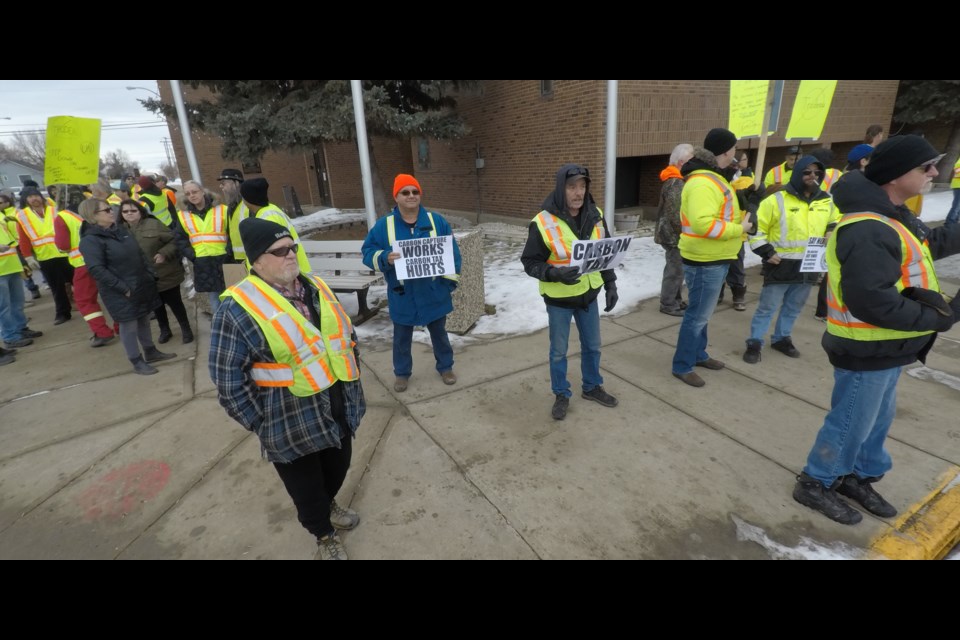Estevan – A global phenomena of protests by people wearing yellow vests came to Estevan on Dec. 15.
Yellow Vests Canada, a Facebook page that started only a few weeks earlier, called for protests at city halls across the country at 11 a.m. By noon, over 50 people were present in front of Estevan City Hall, nearly all of which were wearing the high visibility vests that have become eponymous with the activism.
Jason Riedel organized the Estevan protest. He works in communications in the oilfield.
“We’re basically demonstrating on behalf of most of the Canadians that are frustrated with the Trudeau Liberals that are trying to implement a job-killing carbon tax on us. And with our UN migration pact, we’re kind of losing our sovereignty with all the people coming in right now. It seems like Canadians don’t have a say in what happens in our country. We’re frustrated with everything that’s going on right now,” he said.
Asked if those were two entirely different topics, carbon tax and migration, Riedel responded, “They are. This is about everything, though. This is about everything that’s going on right now. We have no control over our borders. We have no control over what’s going on with the work in the west right now. The carbon tax is killing us. The people coming in illegally over the border is killing us, and it’s getting to the point where there’s no money for Canadians, anymore, even though we’re the ones paying the taxes.”
He noted the Yellow Vests Canada Facebook page started Dec. 5. Ten days later, it had 55,000 members.
Specifically, they’re angry with the federal Liberal government. Riedel said, “They don’t seem to listen to what Canadians want. They seem to make the rules up as they go. Canadians should have a say in what changes happen in this country.”
Regarding the carbon tax, he said what happens in Ottawa is totally different from what happens in Saskatchewan. “They just don’t look at things here, from our perspective. People have been out of work for so long in the oilfield, and there’s nothing really happening to try to alleviate the problems here now.”
With the prospects of various units of coal generation being shut down due to federal greenhouse gas policies, he said, “What are they going to do to replace it? Solar and wind is going to work? Look at today. It’s cloudy and there’s no wind. So where are you going to get your power from?”
He suggested moving towards more carbon capture projects instead of carbon tax.
On migration he said, “It’s not really a matter of race. If you want to come to Canada, it doesn’t what your nationality is, or where you come from, if you do it through legal channels, you do the proper paperwork to get across the border, it could take months. It could take six months. But to come across the border illegally, and you’re on our health care system and we’re having to put you up.
“My mother’s a senior. She got a 50 cent raise in like two years. There’s a lot of people that are struggling now, that have lived here their whole life, that have paid taxes their whole life, for them, it’s not fair for people to just walk across the border and the government just hands everything over.
“If you want to come to Canada, no problem. Do it the legal way. That’s the best thing to do. And it’s fair for everybody,” Riedel concluded.
Bobby Kyle worked six years on service rigs and one on drilling rigs. Now he’s working in construction. Carrying a sign that would not be considered complimentary to the Trudeau, he said, “This immigration policy, I think, personally, is going to start destroying my life and my kids’ lives, just by bringing in all these extra people. We don’t need it.
“It’s not about race. At this point, it’s about we’re opening our borders to a foreign entity that can totally, absolutely destroy our country,” Kyle said.
He sees the common cause as this: “We all hate Trudeau.”
Over the sound of honking horns from passing traffic, David Grass said, “I am a coal miner.”
He hopes to keep mining “as long as we can keep it going.”
Grass said, “It’s sad to see. With the advancements they made with carbon capture here, it’s sad to see it’s getting ignored by this Liberal government’s environmental policies.”
“I’m here today to protest the fact they’re implementing a carbon tax. It doesn’t do anything for reducing emissions. We’re showing that you apply the technology instead. Instead of taxing the people, you put the money into technology.”
He said the current federal government is not promoting carbon capture, while the previous Conservative government put $240 million into the Boundary Dam 3 (BD3) Integrated Carbon Capture and Storage Project.
While Saskatchewan has long sought a fleet-wide equivalency agreement which would allow it to spread emissions reductions from BD3 across multiple coal burning units. The federal Liberal government has offered no movement on that front, and time is running out for Boundary Dam Units 4 and 5.
Grass said, “That equivalency agreement is part and parcel the same thing as what they’re doing in Quebec, when they share carbon credits with other states. So they okay it for them, but our own agreement, to do it intraprovincial, they say no? It’s hypocritical.”



